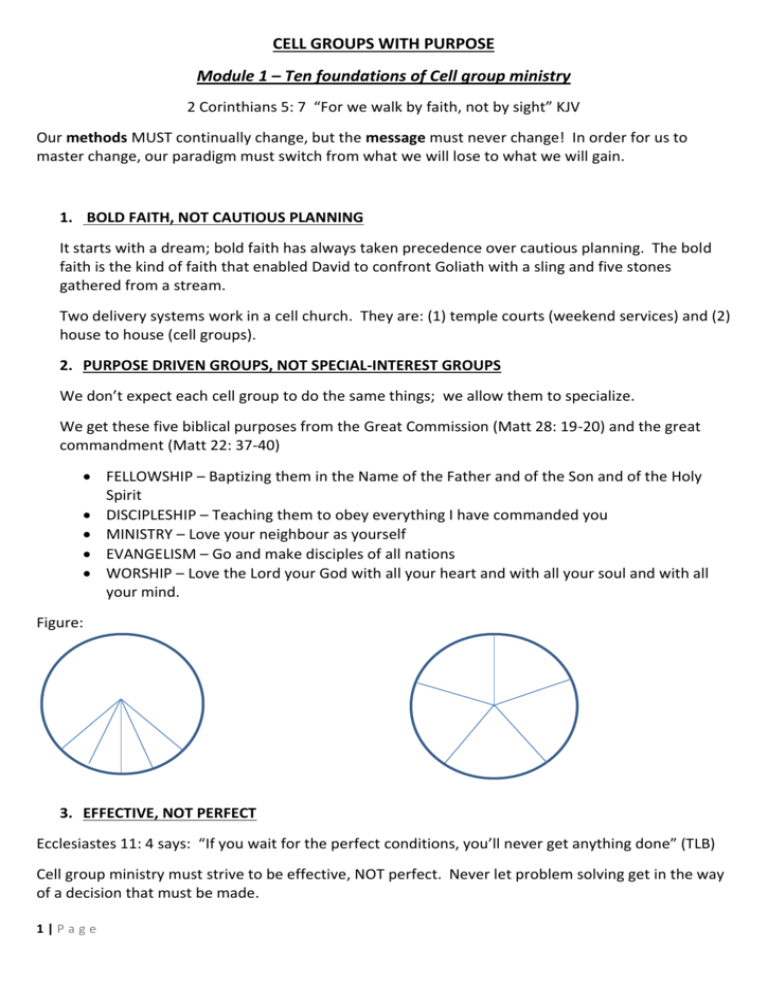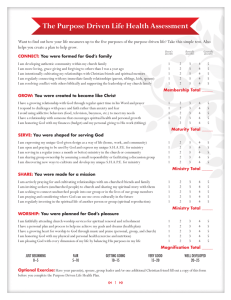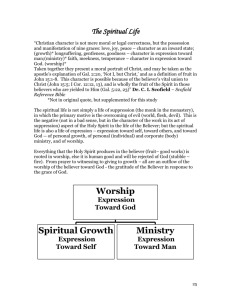Church of cell groups
advertisement

CELL GROUPS WITH PURPOSE Module 1 – Ten foundations of Cell group ministry 2 Corinthians 5: 7 “For we walk by faith, not by sight” KJV Our methods MUST continually change, but the message must never change! In order for us to master change, our paradigm must switch from what we will lose to what we will gain. 1. BOLD FAITH, NOT CAUTIOUS PLANNING It starts with a dream; bold faith has always taken precedence over cautious planning. The bold faith is the kind of faith that enabled David to confront Goliath with a sling and five stones gathered from a stream. Two delivery systems work in a cell church. They are: (1) temple courts (weekend services) and (2) house to house (cell groups). 2. PURPOSE DRIVEN GROUPS, NOT SPECIAL-INTEREST GROUPS We don’t expect each cell group to do the same things; we allow them to specialize. We get these five biblical purposes from the Great Commission (Matt 28: 19-20) and the great commandment (Matt 22: 37-40) FELLOWSHIP – Baptizing them in the Name of the Father and of the Son and of the Holy Spirit DISCIPLESHIP – Teaching them to obey everything I have commanded you MINISTRY – Love your neighbour as yourself EVANGELISM – Go and make disciples of all nations WORSHIP – Love the Lord your God with all your heart and with all your soul and with all your mind. Figure: 3. EFFECTIVE, NOT PERFECT Ecclesiastes 11: 4 says: “If you wait for the perfect conditions, you’ll never get anything done” (TLB) Cell group ministry must strive to be effective, NOT perfect. Never let problem solving get in the way of a decision that must be made. 1|Page 4. INTENTIONAL FOCUS, NOT FLAVOUR OF THE DAY Cell groups’ main vision is to see every person, from the core of the church to the ever-growing community, connected in a healthy cell group. Cell groups’ main mission is that we help spiritual seekers become transformed believers who model purpose driven lines and motivate others to do the same. To often cell-leaders focus more on getting people into cell groups than on defining the purpose of the cell group ministry. Don’t let lack of focus and purpose become a real problem. You must be able to describe the process that people go through from the time they walk in your door as guests in a service to the time they are plugged into some kind of cell group!!! 5. LEADERSHIP POTENTIAL, NOT PROVEN LEADERS YOU DON’T NEED ALL-STAR, SUPERTRAINED CELLGROUP-LEADERS, you need people who are willing and obedient. Remember God doesn’t call the equipped; He equips the called. The problem in churches is that we often skip past the “follow me” and scare off leaders by asking them to “come and die for me”. If you wait for perfect people to lead cell groups, you’ll be waiting until Christ’s return!!! Unhealthy Healthy (unbalanced) (balanced) 6. SIMPLE SYSTEMS, NOT COMPLEX STRUCTURES Success of leaders is determined by the support and resources they receive. Some people believe every cell group should receive equal care, but we have found that not all groups are equal. We believe in strategic care, not equal care. Some groups have mature leaders, some brand new leaders, some are full of baby Christians. Of course we love them all, but we found that strategic care is much better than equal care. 2|Page 7. CHURCHWIDE ALIGNMENT Every ministry leader, MUST buy into the overall vision and mission of your church. Cell groups are NOT optional at our church!!! 3|Page 8. GROWTH BY CAMPAIGNS, NOT DISRUPTING THE COMMUNITY Cell group ministries live in constant tension between fellowship and evangelism. We want cell group members to develop deep relationships, but we also need to integrate new people into groups. Many churches handle integration of new people by asking existing groups to add new members or to break up and multiply into two or more cell groups. RESULT = Members resent intrusion and get frustrated. We have found that it is better for all concerned to START NEW CELLGROUPS than for existing groups to multiply! How do we integrate new people? In short, through campaigns. Since 2004 we have had more people in cell groups than attend our weekend services. Rather than taking energy from our cell groups by forced division, the campaign approach focuses on relationships, NOT multiplication. We don’t subscribe to the theory that a cell group needs to be kept at an optimum size. Some people are just natural gatherers. In other words, we tell our cell group leaders they can grow their group as big as they like and we’ll show them how to foster an environment for life-changing, healthy community. 9. EMPOWERED GROUP MEMBERS, NOT PASSIVE SPECTATORS Share and rotate leadership as a natural flow of group life. We don’t want traditional strong leaders teaching listening members. 10. MASTER TEACHER CURRICULUM, NOT LEADERS AS BIBLE MASTERS People are often reluctant to become leaders because they have limited bible knowledge. Of course, we provide our leaders with additional tools, but we use master teacher curriculum to start them on a pathway 4|Page Module 2 – The Paradigm Shift Remember everything we do in cell group ministry is biblically based! Cell groups were foundational to the early church. We find the answer in Acts 2: 42-47: Act 2:42 And they continued stedfastly in the apostles' doctrine and fellowship, and in breaking of bread, and in prayers. Act 2:43 And fear came upon every soul: and many wonders and signs were done by the apostles. Act 2:44 And all that believed were together, and had all things common; Act 2:45 And sold their possessions and goods, and parted them to all men, as every man had need. Act 2:46 And they, continuing daily with one accord in the temple, and breaking bread from house to house, did eat their meat with gladness and singleness of heart, Act 2:47 Praising God, and having favour with all the people. And the Lord added to the church daily such as should be saved. Cell groups and the greater church must be focused on all five of the biblical purposes: (1) they fellowshipped, (2) discipled, (3) ministered, (4) evangelized and (5) worshiped. 1. THEY FELLOWSHIPPED Members in the body of Christ joined in fellowship. They had fun together, they laughed together, they ate together (Acts 2: 46). True fellowship not only connects members to each other, but also connects them to Christ. 2. THEY WERE DISCIPLED AND GREW SPIRITUALLY The Bible says, “They devoted themselves to the apostles’ teaching” (Acts 2: 42). That means they devoted themselves to growing in Christ and maturity. Discipleship is NOT only learning about the Word of God but also living out its truth in every aspect of their lives through the five biblical purposes. 3. THEY MINISTERED TO EACH OTHER “They gave to anyone as he had a need” (Acts 2: 45). These groups become an outlet for support, ministry, benevolence, charity and shared meals – all in group context. Cell groups need to be more than only a “once-a-week meeting”; they should be engaged in ministry and meeting the needs of people within the body of Christ. 4. THEY EVANGELIZED THE LOST This was their mission: “And the Lord added to their number daily those who were being saved” (Acts 2: 47). If you’re only going to fish once a week, you’re only going to catch fish once a week!!! Cell groups are a great place to prompt members to begin praying and evangelizing their neighbours, friends, work colleagues, etc. 5. THEY WORSHIPED Early Christians worshiped in their homes. What was the result? “Everyone was filled with awe and many wonders and miraculous signs were done by the apostles” (Acts 2: 43) Times of worship in cell groups must be focused on God’s presence and we must express our love through song, prayer, praise and worship. 5|Page Module 3 – Define success clearly What does a healthy follower of Christ look like? A healthy follower of Christ is: Surrendering his/her heart and life to Christ on an on-going basis Experiencing fellowship with other Christians Growing in Christ through being and action Discovering and using his/her God-given gifts and abilities Reaching out and sharing the love of Christ with nonbelievers Unless you know what the target is, you cannot hit it! BEGIN WITH THE END IN MIND Why cell groups? They are biblical – As seen in Acts They are convenient – Cell group supplies you with a venue in house form They are economical – Homes do not put strain on church building resources They are unlimited in size – As church grows, add more groups They are unlimited in reach – Wherever you have people, you can have cells They provide accountability – Each member has immediate support system They provide a safe environment – Members can explore their gifs They provide focus – Collection of people working on common goals – not one person teaching while others listen. WE ARE NOT A CHURCH WITH CELLGROUPS, WE ARE A CELLCHURCH (Church of cell groups) Figure: Church groups With Of Youth Events Children Weekend Service Small Senior Citizens groups Outreach Sunday School Shalom Dynamics Groups Purpose driven life 6|Page DEFINE SUCCESS ON ALL LEVELS THE CHURCH – church structure and activities get people into groups CELLGROUP MINISTRY - strives to bring health and balance to all groups CELLGROUPS - individual groups balance the purposes for health INDIVIDUAL - balances the purposes in his/her life and heart for health Remember cell group ministry will not be any stronger than its leaders, and your leaders will not be any stronger than you!! Also remember a true shepherd smells like the sheep! 7|Page Module 4 – Build a foundation for health and balance Figure: Healthy and unhealthy groups Unhealthy Healthy (unbalanced) (balanced) Figure: Facilitate conversations, don’t just teach Dispensing information Facilitating information Leader Member Leader Member Member Member Member Member Member Member Member Member Member Member ROTATE LEADERSHIP Imagine this: Lisa is in charge of breaking the bread in tomorrow cell group. Our new-born daughter, Erika, had been up all night crying. Obviously, Lisa didn’t get much sleep. When she finally fell asleep, it was very near morning. All too soon…………. her alarm goes off. She turns it off with the intention of getting up, but she immediately falls back asleep. When she wakes up later, she realizes she doesn’t have as much time to get ready as she would like. Lisa jumps out of bed, gets dressed, and pulls herself together quickly. Then she turns to me and asks the deadly question: “How do I look?” I have been married long enough to know there is no right answer to that question. If I say, “You look good,” then I am a liar. If I say, “you look bad,” them I am in even more trouble. So I answer with another question: “How do you think you look?” Okay, we won’t go into her response to me!!! The point is, would she have even bothered getting out of bed that morning if she did not have a responsibility to the group? NO, she would have tried to catch up on a little sleep, reasoning that it wouldn’t be a big deal if she didn’t show up; she could just catch up the following week. But since she has a responsibility and the group is counting on her to fulfil that duty, she meets with her group that morning! 8|Page Without shared ownership/rotate leadership of the group, it is easy to slide into poor attendance and eventually just quit coming. Or worse yet, without shared ownership, members may sit in a cell group week after week and never develop their giftedness. As a cell group leader start saying the following, “We are all going to take turns leading during the coming weeks. Who wants to lead next?” Doing this, you bring members along slowly and empower them to use their leadership skills. ATTEND SERVICES TOGETHER Get members to be together during services. Maybe a cell group can share a meal afterwards or just fellowship after the end of the service. GROW THROUGH CONFLICT Remember the enemy doesn’t want us to grow closer together and experience true community. So advise your cell group leader and members to expect the lows, and train them how to use conflict to mature through the rough times. MINISTER TO ONE ANOTHER It is easier to define and use one another’s gifts in cell groups. A cell group is the perfect environment for identifying a person’s gifts and to give suggestive next steps. Allow members to minister to one another during cell group meetings. BE LOVINGLY PASSIONATE IN EVANGELISM People who are resistant to church just might agree to drop by for a barbecue!?! Invite them, let them have a good time and without realizing it, you all are fellowshipping together. Invite them to a group meeting next week, by this time they already know the members of the cell group already! ENCOURAGE MEMBERS TO MEET SOCIALLY Tell members to visit each other and have regular fellowship times. Seeing people from various perspectives will give you insights into their life. FOLLOW EACH OTHER ON SOCIAL MEDIA Groups that use social media tools such as Facebook and Twitter create an on-going conversation with each other. Members know more of what is going on in each other’s daily lives through constant updates and tweets. It helps members to build deeper relationships with each other. 9|Page Module 5 – How to create a Church of Disciples, not attendees If new believers are spiritual babies, what do babies need most? Do they need education first? No. They need love, attention, care, nurturance and protection. New Christians need the same things. They get those things from relationships with other Christians. So where is the best place to develop strong relationships with other Christians? The CELLGROUP!!! Our number one strategy for helping new believers is to get them into a cell group. Once they are part of a spiritual family, we know they will get the guidance they need for their spiritual walk. THE GOAL IS TRANSFORMATION, NOT INFORMATION We want a group of people who are all involved in the discipleship process, NOT a teacher and a roomful of students! OPPORTUNITY AND RISK, FEAR AND FAITH When people are presented with an opportunity to grow, a certain degree of risk is always involved. See fig Fear Opportunity Faith Risk Set the bar low (crawl level). Once they have been successful at the crawl level, which builds their faith, then you can ask for a “walk” commitment. 1 Samuel 17 is a perfect example of opportunity-risk or fear-faith cycle in David’s life. His first opportunity was shepherding sheep. David was quite young, so perhaps he was a little fearful of such responsibility. He accepted the risk, however, and it builds his faith. His next opportunity came in the form of a bear. Then a lion came. He took the risk and killed the lion and the bear, and his faith continued to grow. David must have realized that whenever he stepped out of his comfort zone in faith, God guided and protected him. One day he came face-to-face with Goliath, the mighty giant. We all know where the story ends, but tell me, how do you think it might have ended if Goliath was David’s first opportunity for risk? Walk through the crawl-walk-run stages. Something we discovered was that when asking people to become cell group leaders, the risk was just too big. Eventually, instead of asking for cell group leaders, we asked for H.O.S.T.s (remember crawl-walk-run!!). A H.O.S.T is someone who has a HEART for the people and is willing to OPEN their place to their group, a person who is willing to SERVE and to TURN on the dvd. 10 | P a g e NEXT STEPS INDIVIDUAL GROWTH Encourage every member to take the “Spiritual Health Assessment” on an annual basis. We will do this assessment later on…. Encourage every member to always be looking for their spiritual next step. GROUP GROWTH Encourage your cell groups to use the “Spiritual Health Assessment” to see the areas where their members need to grow spiritually. Encourage the group to design a “Group Health Plan” Explained later on… START SMALL Start small – challenge only one or two people to join them in spiritual exercise. KEEP IT INTERESTING Jesus certainly wasn’t boring! Visit www.smallgroups.net/free for great material to keep it interesting! 11 | P a g e Module 6 – Mobilize Your Groups from Sitting to Serving People often fail to serve, not because they don’t want to serve, but because they fell they have nothing to offer or they have not been offered specific opportunities. Exodus 18: 13-26 tells the story of Moses being overworked and the advice given to him by his fatherin-law, Jethro, that solved the problem. The Problem: Moses carried a very heavy workload and was burning out. Each day he took his seat as judge, and anybody with a complaint came to him expecting him to solve their problems. The Solution: Jethro told Moses to divide the ministry among other God-fearing, trustworthy leaders. Moses you’ve spend too much time talking to the people of God, instead of talking to God. The Strategy: Moses set up a tiered structure of leadership. He appointed leaders of thousands, leaders of hundreds, leaders of fifties and leaders of tens. The Result: Moses was relieved, others were given opportunities to serve God, and everyone had their needs satisfied. I tried to be everything to everybody and meet every need. After all, that’s what a pastor is supposed to do – right? Wrong! God never intended for the church to be run by hired guns that do all of the work while the members show up for the weekend show. As a church leader, your job is NOT to do everything. No matter what your level of involvement in ministry, whether you are the senior pastor, associate pastor, an elder, an cell group leader etc., your job is NOT only to use your giftedness but also to help others use theirs. And you can do that by doing four things: KNOW – Help them understand the biblical concept of serving through consistent teaching. GROW – Help them grow by developing their sweet spot in ministry. GO – Help them serve by providing them specific and multiple opportunities for service. SHOW – Help them feel appreciated by showing your gratitude throughout the year. Important: Church leaders will need to give the ministry away to the members of the church! Important: Every member is a minister! Important: It’s not what’s taught – it’s what’s caught! In cricket, they use the term: The Sweet Spot of the Bat. That’s the area on a cricket bat that hit the ball the best and the hardest! You must help your members find their “sweet spot”. Help them discover their GOD-GIVEN S.H.A.P.E!! S – Spiritual Gifts. What are you gifted to do? H – Heart. What passions do you have? A – Abilities. What do you naturally do better than others? P – Personality. How has God wired you to navigate life? E – Experiences. Where have you been and what have you learned? 12 | P a g e Ephesians 2: 10 tells us that God sees us as His masterpiece. “For we are God’s masterpiece. He has created us anew in Christ Jesus, so we can do the good things he planned for us long ago” (NLT). People of the church MUST know that they have a role to fulfil. It is specific to them; they have been placed in this church to make a specific and unique contribution. At SHALOM we provide three venues for discovering S.H.A.P.E : SHALOM DYNAMICS SHALOM BIBLE COLLEGE & CELLGROUPS Important: A healthy cell group is a community of people who challenge each other to become all that God destined them to become! GO: HELP THEM SERVE BY PROVIDING SPECIFIC AND MULTIPLE OPPORTUNITIES FOR SERVICE 1. Give authority with responsibility. When you ask people to be purpose champions, give them the authority to get it done. Don’t look over their shoulder! 2. Utilize the power of asking. Sometimes we think people aren’t willing to serve, but the truth is that very often they have never been asked to do a specific task. Encourage cell group members to each do something. 3. Motivate people to service through encouraging them. Most people don’t volunteer without being asked. Motivate people by encouraging them that they can make a difference in His Kingdom. 4. Always think incrementally. Teach cell group members to apply crawl-walk-run stages. 5. Share serve stories. Give members a chance to share their stories and tell of their experiences serving. 6. Use cell groups as a way to introduce people to service in a non-threatening way. SHOW: HELP THEM FEEL APPRECIATED BY SHOWING YOUR GRATITUDE THROUGHOUT THE YEAR It’s not enough to tell people you appreciate them – show them!! An appreciation event, a connection rally, a meal-time gathering etc. Here is what a gathering can do for the church: Unite people under the same focus Cast vision repeatedly Reaffirm why they do what they do Honour them and show value for what they do Connect them with others in similar positions Align people behind a common vision and goal of the senior pastor Help them see what part they play in that vision Give people a chance to see their leaders up close and personal. (Remember to invite the leaders!! Pull people together Empower future leaders 13 | P a g e Instil discipline and motivation to carry vision forward Fuel the vision through motivation and inspiration Produce excitement through demonstration of community Show the authenticity and integrity of the leadership Begin to teach your future leaders how to think out of the box Important notes on organizing a gathering: Set a date – don’t interfere with church year plan. Make sure the date works for the senior pastor Make sure the date chosen falls at a time that provides optimum impact Have good worship Provide food Include costs for the gathering in your cell group ministry budget Emphasize the importance of contribution Use word-of-mouth advertising Keep creative, fresh and new by building on a theme Include personal recognition in the program The more personal the better Send all participants a thank you note Celebrate the event 14 | P a g e Module 7 – The Church with No Walls TRUE STORY OF A PASTOR: My son Ethan is a special needs kid. When I take him to the playground, my prayer as his dad is always the same: “God, would you please help him connect with some kid? Any kid. I don’t care who it is. Just let him connect so they can play together.” I sit at a picnic table and watch my child navigate the playground. Honestly, it can be brutal. To see him rejected, or worse yet ignored, really hurts me. I remember times when he came home from school and said, “Daddy, they said I’m different.” As his dad, who loves him more than anything in the world, it just kills me to hear this. Watching it from a picnic table on the playground is even worse. So I sit there and pray that he will connect with someone and won’t be alone on the playground. Fortunately, God answers my prayers more often than not. But there have been painful times when I had to sit and watch him in isolation while others played nearby. Now let’s change the playground a bit. Let call the playground your church, your cell group or where you hang out. And now it’s not me watching, but your Heavenly Father. He has sent some children to your playground. Maybe you aren’t comfortable around them because they don’t act the same way others do. So you just ignore them or outright reject them. Now imagine God watching and saying, “Please connect with him. Reach out to her. Connect with my beloved child.” Can you imagine the pain God must feel as we walk by, right past his child? FACT: There is always tension between Fellowship and Evangelism. Let’s agree, we want to do evangelism in our cell groups. If the birthing of new groups out of existing cell groups works – great, but if not, let’s also agree that we need to figure out how to accomplish evangelism in the cell groups! The following works: 1. It is easier to start a new cell group than to multiply existing groups. 2. It is easier to empower a new person to be a H.O.S.T GROUP SIZE Never penalize people who a natural gatherers!! Can groups then be bigger than 8 or 12? YES!!! Look at the following figure to explain how: Figure: Group meeting Start together 15 | P a g e Subgroup during Stop together 1. 2. 3. 4. 5. WELCOME together WORSHIP together WORD separate groups WORKS separate groups CLOSING together So we can have groups larger than the said 8 or 12. Remember is all about transformation and not information – NOT ANOTHER CHURCH SERVICE, but a cell group! 16 | P a g e Module 8 – More than Music Heb 12: 28 (NLT) Since we are receiving a Kingdom that is unshakable, let us be thankful and please God by worshiping Him with holy fear and awe. HIDE-AND-SEEK Adults like to play spiritual hide-and-seek. We act and speak a certain way in church, but we act differently in the community. The heart of worship is daily, on-going surrender of all areas of your life to God. TRUST LESSSON…………………. BASICS OF WORSHIP IN CELLGROUPS Expressive Worship Prayer Thanksgiving Music Sharing testimonies Reflective Worship Silent Prayers Solitude Moments (afsondering) Meditation Fasting Confessional Preaching If we want our people to be real, it has to start from the top. People are more endeared to us through our weakness than our strength. Ensure that every cell group meeting has time for worship. Expressive Worship with prayer and music should form part of cell group meetings!!! 17 | P a g e Module 9 – Spiritual Health Assessment Get attached “Spiritual Health Assessment” and complete it. Once finished add the scores and enter into the following areas: There are no perfect scores!!! AREA Worship SCORES Fellowship Discipleship Ministry Evangelism Look at the areas and scores. The area in which you scored the lowest, is the area in which you must improve your spiritual health. REMEMBER first to crawl-run-walk as you grow in an area of concern. Now do this same assessment in your cell groups. Use people with higher scores in certain areas to “lead” the group in that area. See the following figure: Figure 10.2 Group health plan Discipleship Ministry Write the names of each of group member and their area of strength to get a picture of health of your group. 18 | P a g e Worship Evangelism Fellowship Module 10 – Helping Cell groups become healthier REMOVE THE BARRIERS These are common excuses you are likely to encounter for people not joining a cell group: I don’t have anyone to watch my kids I don’t want to share my personal life with strangers I am not spiritual or very religious, so I wouldn’t fit in I don’t have enough time I don’t know enough about the Bible I tried a cell group once and didn’t like it I don’t want to get into any sort of long-term commitment IMPORTANT: Get to know the minds of your unconnected sheep and determine ways to help them get past their barriers. IMPORTANT: What is said in the group stays in the group. GROUP PEOPLE BY AFFINITY Common culture – similar stage of life Common suburbs – living close to one another Common concern – groups build around certain family issues or social concerns Common crisis – This could be a health crisis, financial crisis, job crisis etc. The idea is to start such groups to provide support and friendship Common commitment – This is for people who are committed to a particular ministry or project 19 | P a g e Module 11 – Selecting and recruiting Leaders DEVELOP A CLEAR BIBLICAL PHILOSOPHY There will be times when people will not return your calls. Groups may fall apart. People will question your philosophy and strategy. If you could just have cell groups without the people, it would be a breeze! Unless your heart is in it and your motivation is strong and true, you are going to give up when the going gets tough. VALUE OF CELLGROUP LIFE If people ask you, “Why does your church have cell groups?” could you answer? It will be your job to carry this banner; it starts with you and moves through you to others. CHOOSING LEADERS Luke 10:2 “The harvest is plentiful, but the workers are few”. What type of people are the best cell group leaders? The following characteristic traits in the acronym F.A.I.T.H F – Faithful. A – Available. I – Inspired. T – Teachable. H – Heart for God. Look for people who are teachable, who are open to a little sanding here and there. SERVANT HEART Do they have a willing heart? Do they take initiative? Do they follow through? Are they willing to take risks? Is their service motivated by love? H.O.S.T Strategy H – HAVE A HEART FOR PEOPLE O – OPEN YOUR PLACE 20 | P a g e S – SERVE T – TURN ON THE DVD Changing the word from Leader to HOST made all the difference in the world. The H.O.S.T Strategy: Term Leader never used Bar is set very low Short-term commitment Training included H.O.S.T.’s are not introduced to any additional training unless they continue with a group L.E.A.D.E.R.S.H.I.P Beyond the initial H.O.S.T. stage! L – Listen to God daily E – Empower every member to share a group role or responsibility A – Authentically shepherd the sheep D – Develop a healthy and balanced spiritual life E – Engage in on-going personal care and development R – Release new potential S – Surrender their lives to Jesus Christ 100% H – Humbly lead the group I – Invest their time in others P – Pray consistently for their group Qualifications for Leadership 1. 2. 3. 4. Leader has accepted Jesus Christ as Lord and Saviour Leader has completed SHALOM DYNAMICS and is a member of SHALOM Leader has committed to complete the remaining SHALOM DYNAMICS training modules Leader is able to answer that there are no problems in the following areas: Leader has no current habitual struggles or moral issues (drugs, alcohol etc.) that would bring shame on the Name of Jesus Christ or SHALOM Leader has no current marital struggles Leader supports SHALOM’s vision and mission without any reservation or addition You cannot lead others unless you let God lead you!!! 21 | P a g e Module 12 – Shalom Cell group Structures SENIOR PASTOR CELLGROUP CO-ORDINATOR CELLGROUP L.E.A.D.E.R.S.H.I.P CELLGROUP H.O.S.T 22 | P a g e Module 13 – Making the most of every opportunity FOCUS ON THE BENEFITS OF GROUP LIFE 1. 2. 3. 4. You will feel more connected to the church, people and God You will spend more time in the Bible and better understand it You will receive support from other believers – support groups! A cell group is an excellent place to grow in spiritual maturity LESSONS FROM CELLGROUP JOURNEY Remember everyone poops! Listen and learn Check your motivation Don’t neglect health – evaluate by health, not numbers Understand that you are a Masterpiece Stay humble Continue learning Develop a good relationship with your Senior Pastor 23 | P a g e








